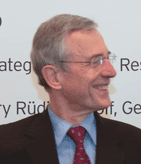Ambassador Klaus Peter Gottwald |
|||||||||||
Ambassador Klaus Peter Gottwald Toward a Common Approach to Nuclear Disarmament:
Just a few months ago, Ambassador Abdelaziz and I were in New York participating in the Review Conference of the Nuclear Non-Proliferation Treaty (NPT), a treaty which has been in existence for 40 years and which, according to the Federal Government’s assessment, is a key pillar of international security. This treaty has been able to prevent the proliferation of nuclear weapons, a threat which greatly concerned President Kennedy, for instance, in the 1960s when he shared his fear that there would be at the very minimum 20 to 30 nuclear weapon states by the present day, if not more. The New York treaty review conference in May 2010, which lasted for four weeks, was therefore a key event, in particular as the preceding review conference in 2005 had not been able to reach a consensus on the indeed quite difficult and rather diverse issues at hand. The task of the treaty review conference was to reaffirm the bargain of the NPT. As I mentioned earlier, it was particularly important because the last conference failed. This time it took place under very interesting circumstances, because for the past year and a half, the United States has been led by President Obama, who in a speech in Prague last year put his country’s policy behind the vision of a world free of nuclear weapons. This conference was therefore the first opportunity to look into ways and means to approach the first place and maybe even to reconfirm and agree on that target. Ambassador Abdelaziz has not only been the ambassador of a particularly important country in this respect [Egypt] but at the same time has faced the very challenging task of presiding over the Non-Aligned Movement, a group of 118 countries. If the United Nations were working with a pure majority vote system, we might not have had to hold a conference; rather, we could just have held a vote on the first day and then we all could have gone home. But in the United Nations, we aspire to the principle of consensus. As you can imagine, finding consensus between 189 different countries is quite difficult, very challenging, particularly as there are indeed quite different points of view between the nuclear weapon states, between other Western countries with high nuclear technology achievements, and between countries that are extremely varied-I would have said, between countries as varied as Iran and Brazil, but these days, of course, the two have a certain degree of cooperation. So, the task at hand was very difficult and when we came to the last and final week of the conference, we asked ourselves whether we would be able to achieve consensus in this specific phase. Both Egypt and Ambassador Abdelaziz, as the country’s representative, played an important role in helping very decisively to bring us all together, both in terms of the task at hand and also physically, because we enjoyed the hospitality of the Egyptian Mission in New York. From the viewpoint of the Federal Government, the conference definitely has been a success in reaching a consensus over these very difficult issues, particularly because it has paved the way by identifying commitments which we all need to meet for the next review cycle in five years time, and beyond, in terms of a common approach to achieve nuclear disarmament, a common approach to fulfill the commitments of the treaty. There is no more competent person around to address you on this issue than Ambassador Abdelaziz, to whom I now give the floor. |
|||||||||||

Top of page | Home | ©2010
Center for Strategic Decision Research
